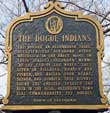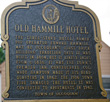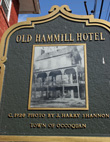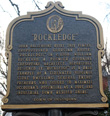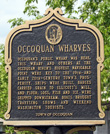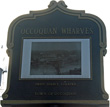
Historic Occoquan Town Markers
Below are views of markers that have been placed throughout the Historic Town of Occoquan to commemorate historic events in the town's history.
Town of Occoquan
 In
1758 when John Ballendine built his dwelling "Rockledge" at
Occoquan, the town began to prosper. By 1765 it was a
flourishing industrial settlement with grist mills, foundry, and
tobacco warehouses. "Rockledge" and a portion of merchants
(Grist) mill still stand at the west end of Mill Street.
Occoquan, a strategic point in the river, saw skirmishes during the
Civil War. General Wade Hampton headquartered here in 1862 at
the Hammill Hotel. The building still stands at the corner of
Union and Commerce Street.
In
1758 when John Ballendine built his dwelling "Rockledge" at
Occoquan, the town began to prosper. By 1765 it was a
flourishing industrial settlement with grist mills, foundry, and
tobacco warehouses. "Rockledge" and a portion of merchants
(Grist) mill still stand at the west end of Mill Street.
Occoquan, a strategic point in the river, saw skirmishes during the
Civil War. General Wade Hampton headquartered here in 1862 at
the Hammill Hotel. The building still stands at the corner of
Union and Commerce Street.
The Dogues, an Algonquian tribe, occupied the Occoquan river watershed in the early 1600s. In their dialect, Occoquan means "At the end of the water". They lived in villages, hunted and fished, and raised corn, beans, squash, and tobacco. They departed as the English settled the area in the 1650s. Occoquan's town seal commemorates the Dogues.
Ex-slave Lewis H. Bailey organized Ebenezer Baptist Church in 1883. It is one of the oldest African-American Baptists Congregations in eastern Prince William County. The original church, built on this site in 1883-1884 was one of Occoquan's first churches. Fire destroyed it in 1923. The current cinder block church was built in 1924.
The three-story hotel, named for operator Edward Hammill, may be occoquan's first brick building. Tradition says it was built in 1804, but it likely dates from c. 1830. It was the town's premier inn. Confederate Col. Wade Hampton made it his headquarters in 1862. The 1916 town fire damaged the hotel. It was converted to apartments in 1942.
John Ballendine built this finely proportioned Georgian House, "Rockledge", in c.1760. William Buckland, a premier colonial Chesapeake architect, reportedly designed it. "Rockledge" is a rare example of a tidewater Virginia dwelling. Several entrepreneurs who sought to maximize Occoquan's potential as a port and industrial town resided there.
Occoquan's public wharf was here. This wharf and others at the Occoquan river's highest navigable point were key to the 19th and early 20th century town's prosperity. Ships were built, barges carried grain to Ellicott's Mill, and flour, logs, fish and ice were shipped downstream. Boats brought traveling shows and weekend Washington tourists.
